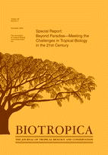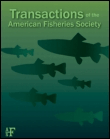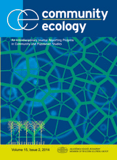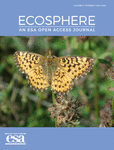
BIOTROPICA
Scope & Guideline
Advancing ecological understanding for a sustainable future.
Introduction
Aims and Scopes
- Biodiversity and Conservation:
The journal emphasizes studies focused on biodiversity assessments, conservation strategies, and the ecological roles of species in tropical ecosystems, aiming to inform conservation practices and policy. - Ecological Interactions:
Research on species interactions, including plant-animal mutualisms, predator-prey dynamics, and community assemblages, is a core focus, exploring how these interactions influence ecosystem function. - Effects of Climate Change:
Studies investigating the impacts of climate change on tropical ecosystems, including shifts in species distributions, phenology, and ecosystem services, are prominent, highlighting the urgency of addressing climate-related challenges. - Land Use and Habitat Alteration:
Research exploring the effects of land use changes, habitat fragmentation, and restoration practices on biodiversity and ecosystem dynamics is critical, providing insights into sustainable management. - Methodological Innovations:
The journal encourages the use of innovative methodologies, including remote sensing, genetic analysis, and citizen science, to enhance data collection and ecological understanding.
Trending and Emerging
- Citizen Science and Community Engagement:
There is a growing trend towards incorporating citizen science in biodiversity monitoring and conservation strategies, emphasizing the role of public participation in ecological research. - Climate Change Adaptation Strategies:
Research focusing on adaptive strategies for biodiversity conservation in the face of climate change is on the rise, underscoring the need for proactive measures to protect tropical ecosystems. - Functional Ecology and Ecosystem Services:
A significant increase in studies examining functional traits and their implications for ecosystem services is evident, as researchers seek to understand how biodiversity contributes to ecosystem resilience. - Urban Ecology and Biodiversity:
Emerging research on urban ecosystems and their biodiversity highlights the interactions between urban development and natural habitats, reflecting the importance of urban conservation efforts. - Anthropogenic Impacts and Restoration Ecology:
There is a heightened focus on understanding anthropogenic impacts, including habitat degradation and restoration ecology, as researchers aim to develop effective strategies for ecosystem recovery.
Declining or Waning
- Traditional Taxonomy:
While taxonomy remains essential, there is a noticeable decline in studies solely focused on traditional taxonomic classifications, as interdisciplinary approaches and functional ecology gain more attention. - Single-Species Studies:
Research centered on single species without broader ecological context appears to be waning, as the journal increasingly favors studies that integrate multiple species and their ecological interactions. - Historical Ecology:
Papers focusing exclusively on historical ecological perspectives are less frequent, indicating a shift towards contemporary applications of ecological research that address current and future challenges.
Similar Journals

Nature Conservation Research
Connecting researchers and practitioners for a greener tomorrow.Nature Conservation Research is a prominent open-access journal that has been dedicated to advancing the field of conservation science since its inception in 2016. Published by the SARANSK FOND PODDERZKI & RAZVITIA ZAPOVEDNYH in the Russian Federation, this journal serves as a vital platform for researchers, professionals, and students alike, providing critical insights into ecological and environmental issues. With an impressive impact factor and ranked in the second quartile across multiple categories—including Agricultural and Biological Sciences, Earth and Planetary Sciences, Ecology, and Nature and Landscape Conservation—Nature Conservation Research stands at the forefront of impactful scientific discourse. The journal not only aims to disseminate high-quality research findings but also seeks to foster collaboration and innovation in conservation practices globally. By ensuring open access to its content, it promotes widespread dissemination of knowledge, crucial in the fight against biodiversity loss and environmental degradation. Researchers and practitioners contributing to the journal will find themselves at the convergence of science and conservation efforts, paving the way for sustainable ecosystem management.

Journal of Fish and Wildlife Management
Advancing conservation through innovative research.The Journal of Fish and Wildlife Management, published by the U.S. Fish & Wildlife Service, serves as a vital resource for scholars, researchers, and professionals in the fields of Animal Science, Ecology, and Conservation Biology. With its ISSN 1944-687X, this esteemed journal has been disseminating critical research findings since 2010, contributing significantly to the understanding of fish and wildlife conservation practices and their ecological impacts. Despite its Q3 category rankings in various disciplines as of 2023, it provides a platform for innovative research that influences policy and management strategies for biodiversity conservation. The journal, although not open access, remains committed to advancing the scientific discourse surrounding wildlife management with articles that emphasize practical conservation efforts and ecological sustainability. Readers can expect a diverse range of articles that promote best practices in the management and conservation of fish and wildlife resources, furthering our collective mission of preserving ecological health and biodiversity for future generations.

TRANSACTIONS OF THE AMERICAN FISHERIES SOCIETY
Illuminating the path for fisheries innovation and sustainability.TRANSACTIONS OF THE AMERICAN FISHERIES SOCIETY, published by Wiley, is a leading journal dedicated to the field of fisheries science and aquatic ecology, with a rich history dating back to its inception in 1872. As an esteemed publication within the realms of Aquatic Science and Ecology, Evolution, Behavior, and Systematics, it currently holds a Q2 quartile ranking, demonstrating its significance and influence in these disciplines. The journal is not open access, which enables a curated peer-review process while ensuring high-quality research dissemination. The journal serves as a vital platform for scholars and practitioners alike, providing essential insights into the management and conservation of aquatic resources. Its commitment to addressing contemporary challenges faced in fisheries and aquatic environments makes it indispensable for researchers, professionals, and students seeking to contribute to this dynamic field.

FOLIA GEOBOTANICA
Bridging the gap between ancient ecosystems and modern plant science.FOLIA GEOBOTANICA, published by Springer, is a distinguished journal dedicated to advancing the fields of Paleontology and Plant Science through the dissemination of high-quality research. With an ISSN of 1211-9520 and an E-ISSN of 1874-9348, this journal has been pivotal in providing a platform for innovative studies from 1994 to 2024. Notably, FOLIA GEOBOTANICA holds a Q3 ranking in Paleontology and a Q2 ranking in Plant Science as of 2023, affirming its relevance and contribution to the scholarly community. The journal is located in the Netherlands at VAN GODEWIJCKSTRAAT 30, 3311 GZ DORDRECHT, and is not an Open Access publication, ensuring comprehensive review processes and scholarly integrity. With Scopus rankings that place it in the 50th percentile for Plant Science and 46th for Paleontology, FOLIA GEOBOTANICA continues to attract researchers, professionals, and students who are keen to explore the intricacies of plant ecology and fossil records, thereby fostering a deeper understanding of ecological and evolutionary patterns.

Ecologies
Advancing ecological understanding for a sustainable future.Ecologies is a dynamic open-access journal published by MDPI, based in Switzerland, which focuses on the interdisciplinary study of ecological and environmental sciences. Since its inception in 2020, the journal has made significant strides in contributing to our understanding of complex ecological interactions, evolutionary processes, and the implications of biological diversity on ecosystem functionality. With its categorization in Q2 for Ecology and various Q3 rankings in related fields, it proudly offers a platform for innovative research that aims to address pressing ecological challenges. Researchers, professionals, and students can benefit from its comprehensive and insightful articles that are freely accessible, ensuring that critical findings are disseminated widely to facilitate informed decision-making and foster collaboration across disciplines. With the impact of climate change and biodiversity loss at the forefront of global discussions, Ecologies plays a pivotal role in shaping the future of ecological research and policy implementation.

OIKOS
Connecting scholars to inspire ecological and evolutionary breakthroughs.OIKOS is a leading journal dedicated to the field of Ecology, Evolution, Behavior, and Systematics, published by WILEY in the United Kingdom. Since its inception in 1973, OIKOS has established itself as a vital platform for researchers seeking to advance their understanding of ecological interactions and evolutionary processes, with its impact reflected in its prestigious Q1 classification in the 2023 Scopus rankings. The journal's dedication to high-quality research is exemplified by its robust ranking of #106 out of 721 in the relevant categories, situating it within the top 15% of journals globally. With a commitment to disseminating influential findings, OIKOS encourages the open exchange of ideas among a diverse range of scholars, making it an essential resource for academics, professionals, and students alike. Whether you are interested in innovative ecological theories or applied research with real-world implications, OIKOS provides a rich repository of knowledge to inform and inspire your work.

Folia Oecologica
Fostering Innovation in Agricultural and Biological Sciences.Folia Oecologica is a distinguished open-access journal published by WALTER DE GRUYTER GMBH, focusing on critical research in the fields of agricultural and biological sciences, ecology, and forestry. Established as a vital platform for the dissemination of knowledge, this journal has been providing free access to its valuable content since 2017, catering to an international audience engaged in environmental and ecological studies. With its ISSN 1336-5266 and E-ISSN 1338-7014, Folia Oecologica has earned notable ranks in Scopus, placing it in the 62nd percentile for Agricultural and Biological Sciences and the 50th percentile for Environmental Science. The journal's commitment to high-quality research is reflected in its positions in the Q2 and Q3 quartiles across various categories in 2023. As it converges years from 2006 to 2024, Folia Oecologica continues to foster scholarly dialogue and collaboration among researchers, professionals, and students, making significant contributions to the understanding and preservation of our ecological systems.

COMMUNITY ECOLOGY
Advancing Understanding of Community DynamicsCOMMUNITY ECOLOGY is a distinguished journal published by Springer Heidelberg that focuses on the intricate dynamics of ecological interactions within communities. Established in 2000 and continuing robustly through to 2024, this journal aims to disseminate significant research findings that contribute to the understanding of ecological processes, species interactions, and community structures. With an ISSN of 1585-8553 and an E-ISSN of 1588-2756, the journal holds a commendable position in the academic sphere, reflected in its Q2 quartile rankings in the categories of Ecology and Ecology, Evolution, Behavior and Systematics. It boasts an impressive Scopus ranking within the 57th percentile for both Agricultural and Biological Sciences and Environmental Science fields, attesting to its relevance and influence. Though it does not currently operate under an open access model, COMMUNITY ECOLOGY remains a vital resource for researchers, professionals, and students eager to advance their knowledge in community ecology, highlighting the importance of collaborative research in addressing ecological challenges globally.

Neotropical Biology and Conservation
Preserving Biodiversity, One Study at a TimeNeotropical Biology and Conservation, published by Pensoft Publishers, serves as a pivotal platform for researchers and professionals dedicated to the understanding and preservation of biodiversity in the Neotropical region. This Open Access journal, operational since 2006 and based in Brazil, invites contributions that delve into the complexities of ecology, evolution, and conservation strategies pertinent to the diverse ecosystems of South and Central America. With a commendable 2023 impact factor reflected in its Q3 rankings across multiple categories including Animal Science, Ecology, and Plant Science, it stands as a valuable resource for academics seeking to publish innovative findings and foster dialogue in these critical areas of study. The journal's commitment to open access ensures that knowledge is readily available to anyone interested in advancing the field of neotropical biology and conservation. Join the global conversation and contribute to the vital work of preserving our planet’s rich biological heritage through rigorous research published in this esteemed journal.

Ecosphere
Connecting researchers to drive ecological discovery.Ecosphere is a leading open-access journal published by WILEY, dedicated to advancing research in the fields of ecology, evolution, behavior, and systematics. Established in 2010 and headquartered in the United States, this innovative journal provides a platform for the exchange of cutting-edge scientific knowledge and discovery, fulfilling its mission to enhance our understanding of ecological systems and their interactions. With a prestigious impact factor reflecting its commitment to high-quality research, Ecosphere is ranked Q1 in both Ecology and Ecology, Evolution, Behavior, and Systematics for 2023, further solidifying its prominence in the scientific community. The journal's scope includes a wide array of topics related to environmental science, making it an essential resource for researchers, professionals, and students aiming to stay at the forefront of ecological research. It offers comprehensive open access options, ensuring that groundbreaking findings are readily available to a global audience, thus fostering collaboration and innovation in the field.